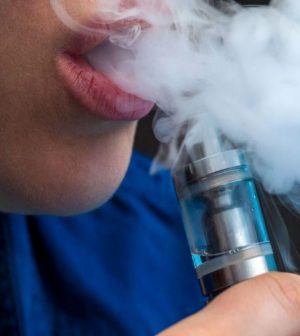- 10 Strategies to Overcome Insomnia
- Could Artificial Sweeteners Be Aging the Brain Faster?
- Techniques for Soothing Your Nervous System
- Does the Water in Your House Smell Funny? Here’s Why
- Can a Daily Dose of Apple Cider Vinegar Actually Aid Weight Loss?
- 6 Health Beverages That Can Actually Spike Your Blood Sugar
- Treatment Options for Social Anxiety Disorder
- Understanding the Connection Between Anxiety and Depression
- How Daily Prunes Can Influence Cholesterol and Inflammation
- When to Take B12 for Better Absorption and Energy
Is There a Link Between Vaping and Eating Disorders in the Young?

College students who vape appear to be at higher risk of having an eating disorder, a new study suggests.
“The study’s findings are especially relevant as we have seen a surge in referrals for eating disorders and substance use disorders during the pandemic,” said study author Dr. Jason Nagata. He is an assistant professor in the department of pediatrics at the University of California, San Francisco.
According to the researchers, an analysis of data from more than 51,000 U.S. college students found that those diagnosed with an eating disorder over their lifetime (such as anorexia or bulimia) were more likely to use electronic cigarettes. However, the study could not prove a cause-and-effect relationship.
Study author Kyle Ganson, an assistant professor at the University of Toronto, said it’s concerning to see more vaping among people with symptoms of eating disorders, because the two together can lead to other health complications, including those of the heart and lungs, as well as neurological problems.
Nicotine could be the common link between an eating disorder and vaping, Gaston said.
“Nicotine vaping may be used by individuals to support eating disorder behaviors and goals, such as suppressing appetite and catalyzing weight loss,” Ganson said in a University of Toronto news release. But he warned that “nicotine vaping can lead to dependence and future polysubstance use.”
Nagata added that “young people who are struggling with their eating or substance use should seek help from a health professional. Clinicians should screen young people for disordered eating and substance use, especially during the pandemic.”
The findings were published online Sept. 11 in the journal Eating Behaviors.
More information
For more on eating disorders, head to the U.S. National Institute of Mental Health.
SOURCE: University of Toronto, news release, Sept. 13, 2021
Source: HealthDay
Copyright © 2026 HealthDay. All rights reserved.










